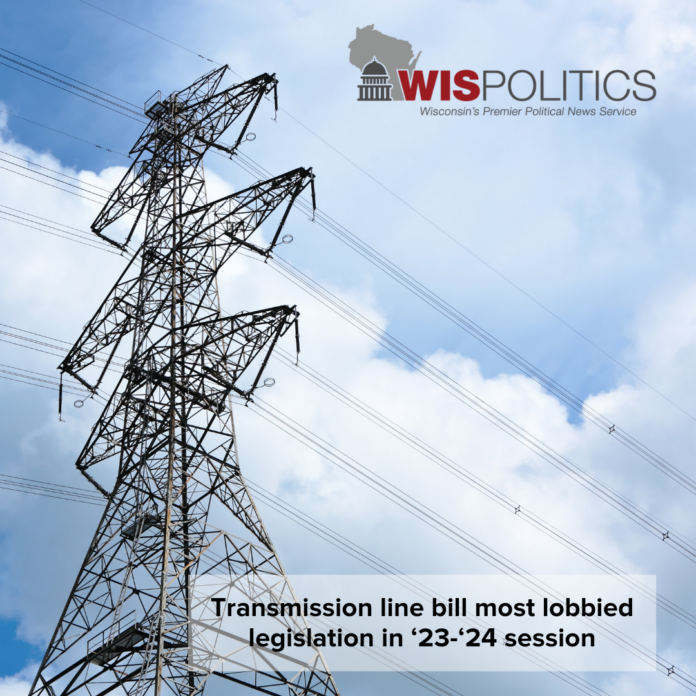Only three of the top 10 most lobbied bills during the 2023-24 legislative session have been signed into law by Dem Gov. Tony Evers.
For the other seven, they mainly failed because lawmakers couldn’t muster the support needed to get the legislation through both GOP-run houses.
A prime example of that was a hotly debated transmission line bill that cleared the Assembly, but failed to get a floor vote in the Senate.
WisPolitics reported in February the legislation — dubbed “right of first refusal” by advocates — was the most lobbied bill over the last half of 2023 with 2,234 hours spent trying to influence lawmakers.
For the first 18 months of the session, groups spent 5,071 hours on the legislation. It cleared the Assembly on a voice vote, but died when the Senate declined to take it up before adjourning in March.
Lobbying reports filed with the Ethics Commission two weeks ago showed groups had spent $57.6 million seeking to influence the state Capitol between Jan. 1, 2023 and July 31 of this year. Following the deadline for groups to file those reports, WisPolitics asked the Ethics Commission to provide a breakdown of hours spent lobbying each bill that was introduced this session. WisPolitics then pulled together a list of the top 10 most lobbied legislation over the 18-month period.
AB 470/SB 481 was by far the most lobbied bill over the 18-month period. Forty groups lobbied on the bill with utilities in support and conservative groups such as Americans for Prosperity opposed. Environmental groups like Clean Wisconsin Inc. also opposed the legislation that sought to give utilities already doing business in Wisconsin the right of first refusal to construct, own and maintain a new transmission line that connects to one of their existing ones.
It was drafted in anticipation of new transmission line work coming into Wisconsin. The Midcontinent Independent System Operator, the regional electric grid that covers the upper Midwest, has approved $10 billion in work on new transmission lines over the next decade, with Wisconsin expected to see about $2 billion of that.
The debate has pitted those who argue it would bring continued stability to the state’s transmission system against those who believe it would stifle competition and lead to higher costs for ratepayers.
Here are the rest of the top 10 most lobbied bills for the period and their fate:
*AB 245/SB 301, which provided a boost in shared revenue to local governments and allowed the city of Milwaukee and the county to impose new sales taxes to address their pension costs. Groups spent 3,864 hours lobbying the legislation, which Evers signed in June 2023 after it received bipartisan support in both houses. Sixty-five groups reported lobbying on the bill, from 7-11 to a string of local governments.
*AB 258/SB 226, which sought to authorize community solar programs. Groups spent 3,465 hours lobbying on the bill, which sought to allow third parties to create solar power programs and allow their subscribers to seek a credit from the utilities for power they received from the private system. It didn’t receive a floor vote in either house. Forty-five groups lobbied on the bill, with utilities opposed to it and groups such as the Wisconsin Realtors and Wisconsin Farm Bureau Federation in support.
*AB 2/SB 2, which sought to repeal the personal property tax. Groups spent 2,941 hours on the legislation, which didn’t receive a vote in either house. But that’s because the repeal of the property tax on business equipment was rolled into the shared revenue bill that was signed into law. Seventy-six groups lobbied on the bill with only four opposed, including Wisconsin Technical College District Boards Association Inc.
*AB 304/SB 332, which sought to overhaul the state’s three-tiered system for manufacturing, distributing and selling alcohol while creating a new Division of Alcohol Beverages under the Department of Revenue. Groups spent 2,161 hours on the legislation, which cleared the Assembly but got bogged down in the Senate. Eventually, Majority Leader Devin LeMahieu, R-Oostburg, found a way around some members of his caucus who were holding up the bill by attaching all of its contents to separate legislation that addressed alcohol issues. That bill cleared both houses and was signed into law. Thirty-one groups lobbied on AB 304/332 with only the Wisconsin Farm Bureau Federation and Wisconsin Farmers Union opposed due to provisions placing new restrictions on wedding barns.
*AB 154/SB 145, which sought to allow those nurses with advanced credentials to work independently of doctors. Groups spent 1,587 hours lobbying the bill, which Evers vetoed. Evers also nixed a similar advanced practice registered nurses bill last session, and the Senate overrode his latest veto in May. The Assembly didn’t take up a veto override before adjourning for the session. Thirty-one groups lobbied on the bill, with groups representing nurses in support and those representing doctors opposed.
*AB 773/SB 737, which sought to limit how much pharmacy benefit managers get from the drug supply chain and require them to pay pharmacies for at least their cost of acquiring drugs. Groups spent 1,583 lobbying on the bills, which didn’t receive a floor vote in either house. Thirty-eight groups lobbied on the legislation, with the Wisconsin Association of Health Plans among those opposed to it and Pfizer among those who backed it.
*AB 312/SB 312, which sought to combat PFAS contamination. Groups spent 1,323 hours lobbying on the bill, which Evers vetoed as he and Republican lawmakers were at odds over a provision to protect so-called innocent landowners. Backers argued the bill would ensure those who didn’t create the perfluoroalkyl and polyfluoroalkyl contamination wouldn’t be liable for the cleanup costs. Evers insisted the provision was worded in a way that would let polluters off the hook. The bill sought to provide the framework to spend $125 million that was set aside in the 2023-25 budget to combat the “forever chemicals,” and Republicans have rejected Evers’ call to release the money since he vetoed the bill. The Senate voted to override the legislation; the Assembly hasn’t followed with a vote in that chamber. Twenty-six groups lobbied on the bill, with Clean Wisconsin Inc. among the groups opposed and the Wisconsin League of Municipalities in support. Fourteen of the groups who registered on the bill didn’t take a position.
*AB 114/SB 110, which sought to extend Medicaid coverage for new mothers to 12 months after giving birth, rather than the current limit of 60 days. Groups spent 1,214 hours lobbying on the bill, which the Senate passed 32-1. It didn’t get a floor vote in the Assembly, where Speaker Robin Vos, R-Rochester, has expressed opposition to expanding the program. Forty-two groups lobbied on the bill; none opposed it.
*AB 103/SB 100, which sought to require health insurance policies that offer prescription drug coverage to count what’s paid for brand name prescription drugs to any cost-sharing requirement or to any calculation of an out-of-pocket maximum amount of the policy. Groups spent 1,178 hours on the bill, which didn’t get a vote in either chamber. Twenty-six groups lobbied on the bill, with the Wisconsin Medical Society among those who supported it and America’s Health Insurance Plans among those opposed.






